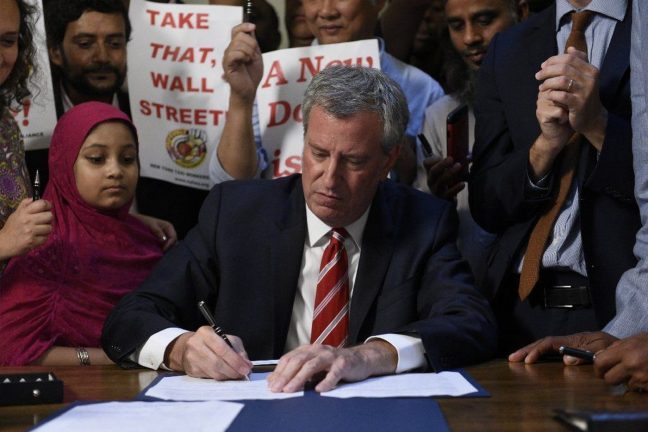
Three years ago, we saw a crisis coming. So we took a stand against corporate greed, worker exploitation and congested traffic with a reasonable proposition: Limit the flood of new for-hire vehicles dispatched by companies like Uber and Lyft.
The reaction was swift. The industry assaulted us with advertising, misinformation and ginned-up consumer outrage.
Three years ago, corporate power won the day, with tragic but predictable outcomes. Thousands more cars kept coming. Traffic ground to a halt. Our city was gripped by the tragedies of drivers who took their lives after they’d seen their livelihoods wiped away.
But last week, New York City got the last word.
I signed new laws passed by the City Council under Speaker Corey Johnson that will check the flood of new for-hire cars. New York is the first city in the country to take this step. This time, David stared down Goliath and David won.
The laws halt new for-hire vehicle licenses for up to 12 months, with the important exception of wheelchair-accessible cars. They give the city power to regulate the number of vehicles and ensure drivers are paid a decent wage. More than 80,000 drivers will benefit.
It will also send a message that cities can and will fight back. We won’t be told what to do by corporations — not big oil, not big pharma and certainly not those whose business model is built on grinding our streets to a halt and our workers into poverty.
So why didn’t corporate power win this time? There’s a lesson in New York for cities around the globe.
Lesson 1: We had the facts on our side.
Three years ago, the data we had to combat corporate spin was thin. Uber exploited that weakness.
This time, we were ready. Studies by the New School and University of California, Berkeley, anchored the debate in two devastating facts.
More than 40% of the app-based cars are driving around empty at any given time. As a result, 85% of New York City app-based drivers are living on poverty wages.
Lesson 2: We had a broad coalition.
Thousands of drivers across the taxi and for-hire industry felt this issue deeply and organized. The New York Taxi Workers Alliance moved people to activism in a way we’ve never seen before in this industry.
Unions outside the for-hire-vehicle industry — like 32BJ and SEIU — lent their strength. Once again, organized labor proved that when working people stand in solidarity, they win.
Lesson 3: We made an argument based on fairness.
The for-hire app services will do anything to shorten customers’ wait times and corner the market for their brands. They’re more than willing to send wages plummeting and flood our streets with cars.
Convenience is a wonderful thing, but it isn’t an organizing principle for our economy. Fairness is.
That’s the case we made. The cold truth about the collapse of the middle class in this industry moved people morally and as a matter of common sense.
This victory is another step forward in our fight to make this the fairest big city in America — but it didn’t happen in a vacuum. I am convinced it is part of a wave building just under the surface of this country.
Americans are fed up with exploitation by corporate interests. They expect their government to intervene. Most would agree with this simple principle: Corporations don’t get to set the rules, the people do.
So as we celebrate, we are reminded of some ageless truths. Change comes from the grassroots. The privileged few may overcome the hardworking many for a time, but not forever.
History shows it. After every defeat, the people come back stronger and win.
De Blasio is mayor of New York.
Source : Daily News
